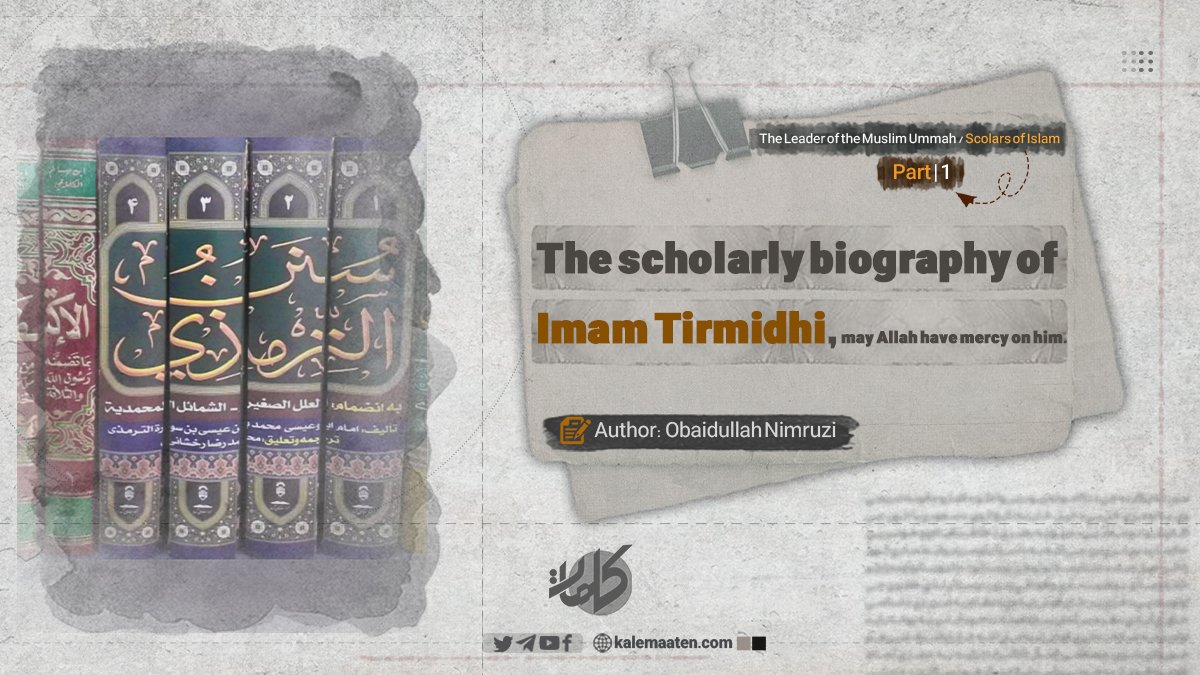
Author: Obaidullah Nimruzi
The Scholarly Biography of Imam Tirmidhi ‘may Allah have mercy on him’ (Part One)
Abstract
Imam Tirmidhi (may Allah have mercy on him) was one of the greatest Sunni scholars and jurists of the third century AH, known as the founder of one of the most authoritative books of hadith, Al-Jami’ Al-Sahih or Sunan Tirmidhi. He played a significant role in arranging and collecting hadith from various Islamic sources and compiled a collection of authentic and reliable hadith that included jurisprudential, ethical, and religious issues. Imam Tirmidhi (may Allah have mercy on him) had a considerable impact on the science of hadith and Islamic jurisprudence with his meticulousness and thoroughness in criticizing and examining the authenticity of hadiths. In addition to Sunan, he also left behind other scholarly works in which he explained the principles of hadith studies. The life and works of Imam Tirmidhi (may Allah have mercy on him) continue to be respected and noted by Islamic scholars around the world.
Introduction
Imam Tirmidhi (may Allah have mercy on him) is one of the greatest and most respected hadith scholars in the history of Islam, who played a significant role in the science of hadith and the jurisprudence of the Sunnis. He was born in the third century AH in the city of Tirmidhi, located in the land of Mawara-e-Nahr, and quickly became one of the foremost authorities on hadith. His scholarly life and works profoundly impacted the methods of collecting, analyzing, and authenticating Prophetic hadith, leading him to be recognized as one of the six great hadith scholars of the Sunnis (al-Sahih al-Sittah).
Imam Tirmidhi (may Allah have mercy on him) left behind one of the most important hadith books in the Islamic world, particularly with the writing of Al-Jami’ Al-Sahih or Sunan Al-Tirmidhi, which includes a compilation of authentic hadiths across various religious and jurisprudential fields. This book holds a special place among other hadith collections due to its accuracy in assessing the authenticity and falsehood of hadiths and distinguishing the authentic from the weak. Additionally, Imam Tirmidhi made great strides in analyzing and criticizing hadiths, clarifying jurisprudential and theological issues, and leaving behind numerous scientific achievements.
In this article, we will examine the biography of Imam Tirmidhi (may Allah have mercy on him), his scholarly personality, his methods of hadith writing, and his prominent works. We will also explore Imam Tirmidhi’s (may Allah have mercy on him) scientific and cultural influences on Islamic history, particularly in the realm of hadith studies. Thus, this article aims to present various aspects of Imam Tirmidhi’s life and clarify his place in the history of the science of hadith and Islamic jurisprudence.
Biography of Imam Tirmidhi (may Allah have mercy on him)
Name and Lineage:
His name is Muhammad, his nickname is Abu Issa, and his father is Issa bin Surah bin Musa Tirmidhi. He is also known by the titles “Hafiz” and “Hujjat.” The full name of Imam Tirmidhi is stated in the Tazkirahs as follows: “Muhammad bin Issa bin Surah (with Fathah on Sīn and Sukūn on Wāw and Fathah on Rā and at the end Tā Marbūtah) Musa bin Al-Dahhak bin Al-Sukūn Al-Salāmi (with Dhammah on Sīn and Fathah on Lām and Kasrah on Mīm at the end Yā) Al-Dharīr Al-Bughi Abu Issa Tirmidhi.”
The term “Salāmi” with Dhammah on Sīn relates to the Banu Sulaym, a tribe of Qais, and “Bughi,” with Dhammah on Bā and Sukūn on Wāw and Ghayn Mu’jamah, refers to Bugh, a village near Tirmidhi located approximately one and a half kilometers away.
Birthplace and Attribution:
The term “Tirmidhi” pertains to the city of Tirmidh, which was once part of Greater Khorasan and a region of Transoxiana. In the fourth century AH, this city was one of the largest located along the Jaihun River. Some sources have recorded the term “Tirmidhi” in various forms such as “Tirmizi,” “Tirmidhi,” and the common local pronunciation “Tirmidh.”
Date and Place of Birth:
He was born in the city of Tirmidh in 209 AH.
Belief and Religion:
Imam Tirmidhi was a hadith scholar and a follower of the beliefs of the righteous predecessors. His views in the book Sunan Tirmidhi attest to his commitment to the Prophetic tradition and the understandings of the companions and followers.
Death:
He passed away in 279 AH at the age of 70.
Scientific Status
Imam Tirmidhi was one of the great hadith scholars in Islam and a pioneer in the science of hadith. The book Sunan Tirmidhi, attributed to him, is a reliable source of hadith among Sunnis. He was not only proficient in hadith science but also in other areas such as jurisprudence and principles, making him an influential figure in advancing Islamic sciences.
Scientific Characteristics:
Imam Tirmidhi was particularly meticulous and skilled in compiling and transmitting hadiths. His works reflect his unparalleled commitment and sincerity in serving the Prophetic tradition. Scholars have praised his scholarly personality and highlighted his precise and fair method of analyzing hadiths.
Influence of Hadith Scholars in Preserving the Sunnah
One of the divine blessings in Islamic history is the presence of prominent hadith scholars who earnestly collected, compiled, and explained the Prophetic Sunnah. Imam Tirmidhi was one of these brilliant personalities who, through his works, played a crucial role in preserving and disseminating the Sunnah of the Prophet (peace and blessings of Allah be upon him).
Imam Tirmidhi (may Allah have mercy on him) is considered one of the pillars of hadith science and one of the esteemed scholars of the Islamic world. His life, efforts, and works serve as a source of inspiration and a valuable example for all seekers of knowledge. A study of his life and contributions illustrates how firm faith, extensive knowledge, and good morals can lead to eternal service to Islam and Muslims.
Continues…


